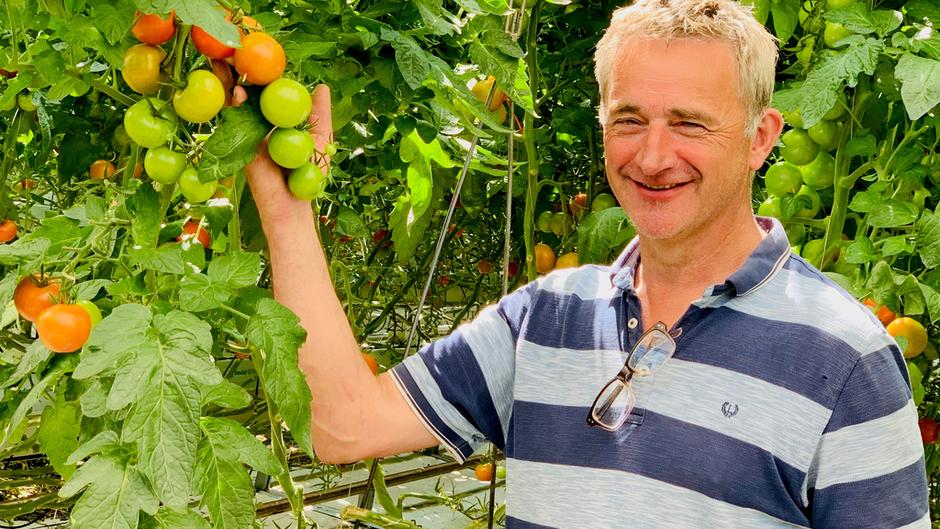The successful family business, established in 1962, is already East Yorkshire’s biggest grower and fifth largest in the UK, supplying over one hundred million tomatoes a year to supermarkets Cooperative, Waitrose, Morrisons and Lidl.
The latest build project, which will add eight more acres of glasshouses to its current 24-acre capacity at its Mill nurseries site, has been fuelled by increased Cooperative orders and is commencing this month, with completion planned for this November.
Now employing over 100 people, Hermanus de Lang, who runs the family business with his two brothers and sister, said their continued growth has been fuelled by a commitment to constant innovation, quality and a desire to use the latest, sustainable growing methods.
Hermanus said: “From adopting Rockwool as our growing medium in the 1980s to introducing sustainable CHP (combined heat and power) generators and straw-fired boilers to heat our greenhouses, and employing organic pest control methods, we have striven hard to stay ahead in a highly competitive industry, while ensuring our products are of the highest possible quality. The increase in Cooperative orders is testament to that.”
Growing is a competitive game in a world where food production is having to keep pace with an ever-increasing population, and Mill Nurseries have had to strive to stay one step ahead throughout their half a century-plus in operation.
Hermanus’ father Gerrit set up Mill Nurseries on a smaller plot across the road from where it is now, after migrating to the UK from Holland in the 1950s. He started off growing lettuces, chrysanthemums and tomatoes in the soil.
“Ironically, given that’s where our dad hailed from, we keep a close eye on what’s coming out of Holland, which is seen very much as the centre of horticulture around the world,” added Hermanus.
“That’s where a lot of the latest innovations in growing stem from, including environmental control sensors to maximise the potential of every plant.
“Dad was a first-generation grower but spotted an opportunity to do in the UK what had been done in Holland for many years. He arrived in the UK with nothing in his pockets, no possessions or even a suitcase and not even able to speak the language.
“He started to build the business through sheer grit and determination, and just not being prepared to take ‘no’ for an answer. We’re extremely proud of what he achieved.”
Other innovations Hermanus and his brothers are leading on in their father’s memory include sustainable growing methods, including adopting hundreds of endangered bumble bees to pollinate the thousands of tomato plants which stretch as far as the eye can see within their vast glasshouses.
Pest control is also done organically. “Tomatoes, like other crops, can be prey to a variety of pests, like whiteflies and leaf miner. An entomologist visits us every week during our eight-month long harvesting period to advise and provide insects like spiders to help target the pests where needs be,” said Hermanus.
And they also take their energy from sustainable sources.
“The glasshouse industry uses a lot of energy,” explained Hermanus, “especially for growing plants like tomatoes which have their origins in tropical climates like South America and need lots of heat. We need to keep our greenhouses at a steady 19 or 20-degree temperature and this was what led to us investing £3.5 million in state-of-the-art new CHP units to replace our old, less efficient ones, three years ago."
Hermanus explains that CHP systems are basically large, gas-fired engines which generate electricity and hot water to heat the glasshouses, exporting what isn’t used to the National Grid.
Not only that, but the flue gases they generate, which would otherwise go off into the atmosphere adding to CO2 emissions, are diverted back into the greenhouses to again help their plants thrive.
The CHP units provide around 50 per cent of Mill Nurseries’ heating needs, and they take their other 50 per cent from a straw-fired boiler which they installed around six years ago. This uses waste straw from the local farmers wheat crops to create a completely renewable form of energy for their greenhouses.
Their water, too, comes from sustainable sources. “We collect all of our rainwater run-offs from the roofs of our greenhouses, and this all goes into a 12 million-gallon reservoir we built on site, which makes us around three-quarters self-sufficient for our water,” said Hermanus.
Not only this, but in the early 2000s, Mill Nurseries were the first UK growers to install fully automatic thermal screen covers inside their greenhouses, designed to reduce their heat input requirements by 25 per cent during the winter months with the added benefit of creating a better growing environment from the shading effect in the summer.
The sheets of glass in the roofs of the new greenhouses will be significantly bigger, further minimising any light obstruction and shadow from the aluminium bars used to contain them, for optimum growing efficiency.
Hull-based electrical specialist Pearson Electrical will be supporting Mill Nurseries with the greenhouse install. The company has worked as Mill Nurseries’ electrical installation partner for the past 20 years, wiring and installing all of their new kit, including the new biomass boiler and CHP units, and taking care of the company’s periodic testing and certifications, as well as reactive maintenance.
“While we have the ability to manually control our systems, they spend most of their lives on auto,” explained Hermanus.
“Everything has to be fully optimised, well planned and fail-safe because the slightest glitch can result in thousands of plants being potentially ruined.


